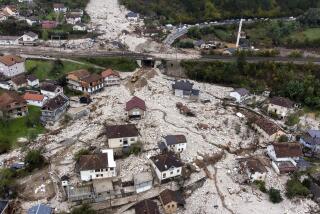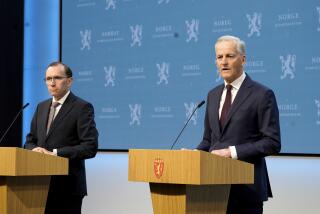EC Recognizes Bosnia as Serbs Besiege Capital
BOSANSKO GRAHOVO, Bosnia-Herzegovina — Ignoring Serbian threats to escalate a siege of Bosnia-Herzegovina, the European Community announced Monday that it will recognize the independence of this former Yugoslav republic now racked by ethnic clashes and paralyzed by roadblocks.
At least six people were killed and dozens were wounded in Sarajevo, the Bosnian capital, when snipers opened fire from a hotel controlled by the Serbian Democratic Party on a peace demonstration outside the republic’s Parliament building. Among the dead was a 13-year-old boy, according to Sarajevo Radio.
The broadcast also reported that the capital’s old Muslim quarter was shelled from Serbian villages in the hills east of the city. Croatian Radio, monitored in this Bosnian border town, said the capital suffered heavy casualties.
Masked and heavily armed Serbian vigilantes erected barricades around Sarajevo and other predominantly Muslim communities, preventing civilian traffic from entering the city.
However, tanks and armored vehicles of the Serbian-led Yugoslav People’s Army appeared to be headed from the Serbian stronghold of Knin, in army-occupied Croatia, to support the militants attacking Sarajevo and other Bosnian cities.
In Bosansko Grahovo, about 20 miles east of Knin, unruly reservists riding in a mile-long armored convoy fired off their mounted guns as the vehicles clattered and smoked over mountain passes, flashing a three-fingered Serbian Orthodox salute and shouting that they were headed for the fight in Bosnia.
Snipers in a nearby encampment of federal troops also fired close over the roofs of passing cars, apparently for the sport of scaring drivers.
Federal army troops are obliged to withdraw from Croatia under the terms of a United Nations peacekeeping plan that is in the process of positioning 14,000 “blue helmet” troops in three areas of Croatia that were the main battlefields during last year’s war that took 10,000 lives.
There are no provisions in the deployment agreement for withdrawal of the federal troops from Bosnia, and the siege of Sarajevo that began Sunday made it clear that the U.N. force will be handcuffed in preventing outbreaks of violence that occur outside the areas of Croatia to which it has been assigned.
The U.N. Protection Force--or UNPROFOR, as it has been dubbed by the international body--is headquartered in the Bosnian capital, but its mandate is to separate combatants in three areas of Croatia only.
Muslim police and Croatian reservists also erected roadblocks around regions of the republic that they control and stopped passing vehicles to check documents.
Croatian soldiers manning one roadblock near the city of Venica said they had blown up the road leading to Sarajevo to prevent army reinforcements from advancing on the capital, 35 miles away.
While both sides in the conflict over the future of this republic are heavily armed and often disorderly, the Serbian vigilantes have displayed a more aggressive manner. At a roadblock just west of the Bosnian city of Travnik, drunken vigilantes wearing black ski masks or lace veils to hide their faces menaced motorists by holding AK-47 rifles to their heads, even after ascertaining that they were unarmed.
The Serbian uprisings, which began last week and have taken as many as 200 lives, were aimed at deterring international recognition of an independent Bosnia-Herzegovina.
Politicians claiming to represent Bosnia’s Serbs, who account for about 31% of the multiethnic republic, lay claim to 65% of Bosnia’s territory, which they seek to link with the Serbian remnants of Yugoslavia.
The republic’s leadership in Sarajevo declared independence late last year, after the 12-nation European Community made clear that it would soon recognize the independence of the former republics of Slovenia and Croatia. Those republics declared independence last June and won EC recognition Jan. 15.
The EC chose not to recognize Bosnia’s proclaimed sovereignty at the same time, arguing that the Sarajevo leadership’s declaration had not been endorsed by a public vote.
When Bosnian officials held a referendum on Feb. 29 and March 1, Serbs were encouraged by their political leader, Radovan Karadzic, to boycott the vote because its victory was assured by support from the Muslim and Croatian communities. About 68% of eligible voters turned out and cast ballots in favor of independence.
Although EC foreign ministers, meeting in Luxembourg on Monday, made good on promises to recognize Bosnia, they again delayed recognition of another former Yugoslav republic, Macedonia.
In a related move Monday, the EC agreed to lift sanctions imposed against Serbia, which it has singled out as the chief aggressor in the war in Croatia. Fighting in Croatia has largely subsided since a Jan. 3 cease-fire negotiated by U.N. envoy Cyrus R. Vance, a former U.S. secretary of state.
The EC move to end a crippling economic blockade of Serbia could provide a face-saving reason for militants to end their siege of Bosnia, since they are not believed to have enough popular support to launch full-scale war. Muslims and Croats, who together make up more than 60% of Bosnia’s 4.4 million people, are as fiercely determined to protect the republic’s unity as the Serbs are committed to dividing it along ethnic lines.
A torrential rainstorm deluged central Bosnia on Monday, dampening enthusiasm on all sides for a protracted fight or manning of roadblocks.
Concurrent with the debate over recognition, the EC has brokered negotiations among the Serbian, Muslim and Croatian communities in Bosnia in an attempt to halt the spread of ethnic violence.
Those talks resulted last month in an agreement to divide the republic, in which no single ethnic group forms a majority, into cantons that would be administered by the most populous ethnic group in each region.
While the agreement was tentative and details were to be worked out at subsequent talks, Serb leader Karadzic announced that the Serb-controlled cantons would secede from Bosnia and join what was left of Yugoslavia--Serbia and the tiny allied Republic of Montenegro.
Bosnia’s Serbian Democratic party announced more than a week ago that it was taking over police and security forces throughout the republic, although some predominantly Muslim squads, like the one in the capital, resisted the takeover.
After snipers fired into the crowd of Sarajevo peace demonstrators demanding an end to ethnic conflicts, Muslim militiamen stormed the Holiday Inn hotel from which the shots were fired. The hotel had been taken over by Serbian gunmen a month ago, when militants protested the independence vote.
Sarajevo Radio said at least four gunmen were arrested in the raid.
The Bosnian government, which distributed Cabinet seats according to an ethnic quota system, was reported by broadcast media to have resigned to allow formation of a so-called national salvation committee.
There were appeals by the leaders of all three main ethnic groups for an end to the fighting, but it was not immediately clear whether the calls would be heeded.
A cease-fire had been agreed to Sunday by Karadzic, Bosnia’s Muslim president Alija Izetbegovic and the Serbian commander of federal forces in Sarajevo, Gen. Milutin Kukanjac. However, fierce fighting flared overnight and continued to escalate throughout Monday.
Sarajevo Television reported that Kukanjac had called on his forces to dismantle paramilitary blockades in the republic.
The army’s role in the Bosnian conflict has come under close scrutiny. The Gargantuan federal force made similar claims of impartiality in the early stages of the war in Croatia, which it eventually entered with unmistakable allegiance to the causes of Serbian rebels.
Like Bosnia, Croatia has a large Serbian minority that opposes independence because it does not want to be severed from the Republic of Serbia.
More to Read
Sign up for Essential California
The most important California stories and recommendations in your inbox every morning.
You may occasionally receive promotional content from the Los Angeles Times.











